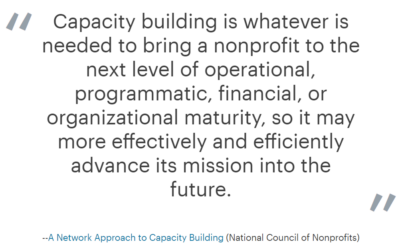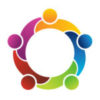
 The work of creating healthier communities begins with strong organizations that have the capacity to create positive community impact. At CHS we use an approach called action learning to help organizations build capacity for accomplishing their objectives. Over the past 25 years we have used action learning formats to help hundreds of organizations develop their talent and strengthen their capacity. The results can be seen in individual learning, team development, organizational performance, and community impact.
The work of creating healthier communities begins with strong organizations that have the capacity to create positive community impact. At CHS we use an approach called action learning to help organizations build capacity for accomplishing their objectives. Over the past 25 years we have used action learning formats to help hundreds of organizations develop their talent and strengthen their capacity. The results can be seen in individual learning, team development, organizational performance, and community impact.
Learn more about our action learning supports below, and contact us to discuss the possibilities.

In today’s organizations people have to learn rapidly and continuously to keep up with the pace of change. They need practical supports that can help them solve challenges right now, without waiting weeks or months for traditional training or consulting programs that might not be responsive to their needs.
Action learning is a powerful strategy for capacity building because it combines tailored supports for learning and action into one integrated program. In an action learning project, participants define the objectives and build their professional skills as they take action to solve practical challenges in their work setting. This is accomplished through a guided experience of action coaching, applied learning support, and participant knowledge sharing. The results can be seen in better performance and stronger capacity.
Action learning has been widely used in various formats in all kinds of organizational settings across the United States and the world. At CHS we have applied action learning to help individuals and teams in health care, human services, public health, and beyond.
CHS has helped hundreds of nonprofits build stronger organizations and create healthier communities through action learning projects. Each project is tailored to provide the right combination of training, tools, technical assistance, and strategy coaching to accomplish the goals of the organizations involved. Some example action learning topics are outlined below.
| Capacity Building Topics | Health Improvement Topics |
|---|---|
|
|
CHS can support action learning for a single organization, an association program, a community initiative, or a state or national collaborative. Whatever the setting, we tailor the format to fit the participants and the program objectives.
| Format | Elements |
|---|---|
| Action Learning Workshops |
|
| Action Learning Programs |
|
| Action Learning Collaboratives |
|
| Action Learning Networks |
|
At CHS we have pioneered to use of virtual action learning to add even more value to this proven approach.
- Like traditional action learning, virtual action learning is tailored to address the specific objectives of the participants.
- The difference is in the virtual delivery of learning supports and action supports to help participants accomplish their goals.
- By using smart technology to deliver supports with a personal touch, we can deliver action learning programs directly to the workplace without asking organizations to spend extra time and money for travel or onsite consulting activities.
- This innovative approach allows us to deliver cost-efficient programs that help participants accomplish their goals for individual learning, team development, organizational performance, and community impact.

Whatever the focus for Action Learning may be, we use a proven, ten-step approach to tailor each project to the particular needs of the participants. The basic steps are outlined below.
|
In this step… |
We can help you… |
|
1. Focus |
Select a focus for action learning |
|
2. Engage |
Engage participants in defining the objectives and approach |
|
3. Assess |
Assess particular needs and interests of participants |
|
4. Design |
Design the program including objectives, learning supports, and consulting supports |
|
5. Develop |
Develop content, engage subject matter experts, and delivery methods |
|
6. Implement |
Implement and optimize the program based on participant feedback |
|
7. Evaluate |
Evaluate the program based on objectives for individual and organizational impact |
|
8. Capture |
Capture key knowledge assets for future use |
|
9. Scale |
Refine and scale the program for the next cohort of users |
|
10. Spread |
Spread the learning with a next-level program |
Visit our project examples page to view examples of action learning projects addressing a wide range of topics.
The Population Health Assessment and Improvement Collaborative

- The Population Health Assessment and Improvement Collaborative is a project of Partnering for a Healthy Virginia , operating under the collaborative leadership of the Virginia Hospital and Healthcare Association (VHHA) and the Virginia Department of Health (VDH).
- The purpose of the Collaborative is to help hospitals and local health districts collaborate for population health assessment and community health improvement within their local regions.
- Participants include professionals from dozens of hospitals and local health districts across Virginia.
- The learning objectives are focused on helping members streamline and optimize organizational strategies for community collaboration, internal team development, analyzing community data, obtaining community insight, producing community assessment reports, and developing community health improvement strategies.
- The learning activities include virtual learning sessions, online resources, technical assistance consults, and strategy coaching.
- The impact of the Collaborative can be seen in more community collaboration, creative development of community data, community engagement strategies, and community health improvement strategies.
- CHS provides support for collaborative design, facilitation, research, data, tools, training, technical assistance, strategy coaching, and evaluation.
- Learn more at the public website for the Collaborative.
The Greater Williamsburg Chronic Care Collaborative

- The Greater Williamsburg Chronic Care Collaborative (GWCCC) works to strengthen the chronic care safety net in the Greater Williamsburg region of Virginia. The Collaborative is sponsored by the Williamsburg Health Foundation, and has been operational for more than ten years.
- The purpose of the Collaborative concept is to help safety-net organizations develop stronger and more sustainable systems of care by working together on behalf of the community.
- The participants include two charitable clinics, a rural health center, a community behavioral health agency, two hospitals, a regional public health district, and a statewide pharmacy access program.
- The learning objectives are focused on building capacity to implement and sustain core elements of the Chronic Care Model originated by the MacColl Institute, adapted for safety net patients.
- The learning activities include virtual learning sessions, an online resource center, technical assistance consults, and strategy consults.
- Collaborative Members have demonstrated positive outcomes related to capacity building, access to care, quality of care, and development of clinical-community partnerships. Thousands of low-income patients with chronic conditions have benefited from the care provided by these organizations.
- CHS provides support for program design, content development, facilitation of learning sessions, online learning, and practice coaching.
- Learn more about the Collaborative at the Williamsburg Health Foundation website.
The PCMH Learning Collaborative

- The PCMH Learning Collaborative is a statewide collaborative of more than 25 community health centers building capacity to obtain patient centered medical home recognition. Funded by the Virginia Community Healthcare Association with federal grant support, the PCMH Learning Collaborative provides a coordinated approach to Patient Centered Medical Home transformation and recognition for Virginia’s community health centers.
- The purpose of the PCMH Learning Collaborative is to help health centers improve and sustain the infrastructure needed to provide high quality patient centered care and to enable all CHCs in Virginia to be successful in their goal of achieving NCQA PCMH recognition.
- The participants are individuals from diverse professional backgrounds who have responsibility for leading PCMH development at their health center. July 2020 marked the beginning of the 5th year of the learning collaborative.
- The learning objectives are focused on building capacity to implement and sustain core Concepts, Criteria and Competencies required for NCQA PCMH Recognition.
- The learning activities include virtual learning sessions, an online resource center, monthly educational updates, one-on-one coaching and technical assistance.
- CHS provides support for program design, content development, facilitation of learning sessions, online resource center, and practice coaching.
- Learn more about the PCMH Learning Collaborative at the Virginia Community Healthcare Association website.
Quality Improvement +

- Quality Improvement+ is a professional learning collaborative for QI leaders in California community health centers, operated by the California Primary Care Association (CPCA).
- The purpose of Quality Improvement+ is to help health centers improve and sustain the infrastructure needed to provide high quality care.
- The participants are individuals from diverse professional backgrounds who have responsibility for leading QI at their health center. Year 1 of Quality Improvement+ included professionals from 20 health centers.
- The learning objectives include practicing positive leadership, promoting a culture of continuous improvement, promoting use of data and measurement, using design thinking in QI, advancing health equity through QI, and leading QI in a telehealth context.
- The learning activities include virtual learning labs for the full group, practice coaching for individual participants, an online resource center, and an applied project where participants use what they are learning to manage an actual QI project at their health center.
- CHS provides support for program design, content development, facilitation of learning sessions, online learning, and practice coaching. In 2021 CHS will design and deliver the program for a second cohort in partnership with CPCA.
- Learn more about Quality Improvement+ at the CPCA website.
SYNC - Transforming Healthcare Leadership

- SYNC is a professional learning collaborative operated as a partnership between the Medical Society of Virginia Foundation, the Virginia Hospital and Healthcare Association, the Virginia Department of Health, Virginia Nurses Foundation, and the Virginia Pharmacists Association.
- The purpose of SYNC is to help healthcare teams develop skills for effective teamwork and leadership for today’s healthcare environment.
- SYNC participants include multi-disciplinary teams from organizations across healthcare sectors and disciplines. Teams often include cross-agency partnerships between healthcare organizations, public health agencies, and community service providers.
- The learning objectives are focused on interprofessional collaboration, leadership fundamentals, 21st-century healthcare, creative problem solving, and individual and team wellness.
- The learning activities include virtual group learning sessions, self-directed learning in SYNC topic areas, and application of SYNC learnings to a team capstone project addressing a real-world challenge within the organization or community.
- CHS provides support for program design, program evaluation, facilitation of learning sessions, an online resource center. We also provide research, data, tools, technical assistance, and strategy coaching for the team capstone projects.
- Learn more about SYNC from the program website.
The Quality Collaborative
- The Quality Collaborative is operated by the Texas Association of Charitable Clinics, and made possible by a grant from St. David’s Foundation,
- The purpose of The Quality Collaborative is to help participating clinics continue their work in quality management while building their capabilities to report on quality indicators and social determinants of health (SDOH).
- Participants include teams from six charitable clinics in the Greater Austin area.
- The learning objectives are focused on managing quality and addressing social determinants of health for clinic patients.
- The learning activities include virtual learning sessions, an online resource center, and technical assistance for practice improvement.
- CHS provides support for program design, content development, facilitation of learning sessions, a project extranet, and technical assistance for participating teams.
- Learn more at The Quality Collaborative resource page.


